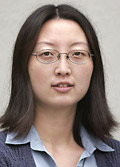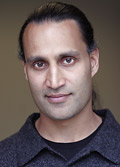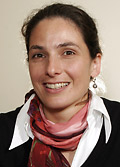Berkeleyan
Three young faculty members named MacArthur 'genius' fellows
Chen, King, Manga still absorbing impact of $500,000 award
![]()
| 22 September 2005
When the MacArthur Foundation called out of the blue last week, Lu Chen assumed it was for references on a colleague being considered for the famous MacArthur Foundation "genius" awards. So, too, did Michael Manga and Nicole King.
"The fellowship director, Dan Socolow, called and asked if I had heard about the MacArthur fellowship award. 'Yeah, sure,'" said Chen, 33. "Then he said, you have won one. I go, 'What?'"
| MacArthur fellow profiles  Chen Lu  Michael Manga  Nicole King (MacArthur Foundation photos) |
King, 35, was equally clueless. "I thought they were asking me for my input on someone else being considered. It took quite a while for it to sink in," she said. "I never got it. They had to say it straight out. It never occurred to me that I would be considered for this. I was dumbfounded."
Chen, an assistant professor of neuroscience and of molecular and cell biology, and King, assistant professor of integrative biology and of molecular and cell biology, join Manga, associate professor of earth and planetary science, in this year's class of 25 MacArthur fellows - an exclusive club of creative and original thinkers given $500,000 with no strings attached over the next five years.
This year, Berkeley is home to more new MacArthur fellows than any other institution, and since the first fellowships were awarded in 1981, 39 campus researchers have been honored. Twenty-eight are still here.
"To be named a MacArthur fellow is a tremendous honor for these three sensational Berkeley faculty members, and we could not be more proud of them," said Chancellor Birgeneau. "It is people like Lu Chen, Nicole King, and Michael Manga doing such remarkable, original work in their fields that makes the Berkeley campus an immensely creative and energized environment."
Cautioned to tell only one person in his life until the awards were made public early Tuesday, Manga, 37, also confided in his spouse, Bancroft Library archivist Susan Storch - but not without second thoughts about whether she could keep it quiet for a week.
"It's obviously a lot of money to do just about any thing you want," he said. "That's what is different about it compared to a typical research grant. It is a lot of money."
Manga, who combines theoretical geophysics with innovative laboratory experiments, intends to use some of the money to travel more and visit the subjects of his research: volcanoes. But he hopes to save much of it to fund highly risky research that is hard to get funded by federal agencies.
"It's very hard to find the money to travel to some of the locations where volcanoes are active," he said, referring to places such as Africa, Indonesia, and the South Pacific islands. "Now I can do that."
Chen, who is trying to understand the synapses that nerve cells use to talk to one another, hopes to invest the bulk of her award until she has a better idea how to spend it. One possibility is using it to fund work using embryonic stem cells.
King has no idea how she will use the $500,000. Her husband, a consultant who had never heard of the MacArthur "genius" award, was awed by the financial windfall, but King sees it as "a huge responsibility. I don't know yet."
However they decide to spend their unrestricted grants, it's sure to alter these faculty members' lives, their careers, and science itself.
"As a group, the new MacArthur fellows are bold and risk-taking people changing our landscape and advancing our possibilities," said Daniel J. Socolow, director of the MacArthur Fellows Program, in the foundation's news release about the 2005 winners.
"Through our support of these 25 remarkable people, we seek to foster their future creative works, as well as to highlight the potential of the individual in shaping a better future for us all," added foundation president Jonathan F. Fanton in the prepared statement.

